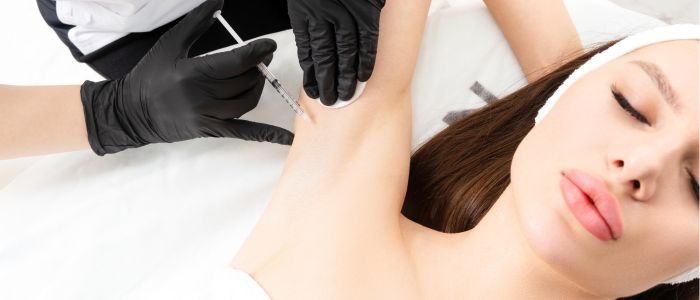
Table of Contents
- Solutions for Excessive Sweating
- What Is Hyperhidrosis?
- What are the Causes of Hyperhidrosis?
- Hyperhidrosis – Common Concerns
- Treatment Options for Hyperhidrosis
- Lifestyle Changes
- Medical Treatments for Hyperhidrosis
- Finding the Right Dermatologist for Your Needs
- FAQs about Causes and Treatment for Excessive Sweating
- Further Reading about Procedures at Cheshire Cosmetic Surgery
Solutions for Excessive Sweating
Sweating is a natural bodily function, essential for regulating temperature. However, for some, this natural process becomes excessive, leading to discomfort, embarrassment, and even social anxiety. The causes and treatments for hyperhidrosis, or excessive sweating, are multiple and varied.
Dr Dalia will help you understand the causes of hyperhidrosis and explore the available treatments.
What Is Hyperhidrosis?
Sweating is a natural and essential bodily function, crucial for regulating body temperature. However, when sweating becomes excessive and disrupts your daily life, it crosses the line into a medical condition known as hyperhidrosis. This condition is characterised by sweating that goes beyond what’s needed for normal thermoregulation, often affecting specific areas of the body and leading to discomfort, embarrassment, and even social anxiety.
It’s important to distinguish between normal sweating and hyperhidrosis. We all sweat, especially during exercise, hot weather, or when we’re feeling anxious. This is our body’s natural cooling system kicking in. Hyperhidrosis, however, is different. It is excessive sweating that occurs even without these triggers, often in specific areas:
- Palms: Sweaty palms are a hallmark of hyperhidrosis. This can make everyday tasks, from shaking hands to holding a pen or using a smartphone, incredibly difficult and embarrassing. Social situations can become minefields of anxiety, leading to avoidance and impacting personal and professional relationships.
- Soles: Excessively sweaty feet aren’t just uncomfortable, they can also create an ideal environment for fungal infections to thrive. The constant dampness can make wearing certain shoes unbearable and lead to embarrassing odours.
- Underarms: Perhaps the most commonly associated area with excessive sweating, underarm hyperhidrosis often leads to visible sweat patches on clothing, causing self-consciousness and impacting confidence. The dampness can also contribute to skin irritation and unpleasant body odour.
- Face and Head: Excessive sweating on the face and head can be particularly distressing. It can interfere with daily activities like applying makeup or wearing glasses comfortably. Socially, it can be incredibly isolating, making individuals feel self-conscious and impacting their interactions with others.
What are the Causes of Hyperhidrosis?
While the exact cause of hyperhidrosis remains elusive, research points to several contributing factors:
- Genetics: Family history plays a significant role in hyperhidrosis. If you have a parent or close relative with the condition, you’re more likely to develop it yourself, suggesting a genetic predisposition.
- Medical Conditions: Certain medical conditions can trigger or exacerbate excessive sweating. These include an overactive thyroid (hyperthyroidism), diabetes, menopause, and some types of cancer. It’s important to rule out any underlying medical conditions when diagnosing hyperhidrosis.
- Medications: Some medications list excessive sweating as a side effect. If you’ve noticed an increase in sweating after starting a new medication, it’s essential to discuss this with your doctor. They may be able to adjust your dosage or suggest an alternative medication.
- Anxiety and Stress: Our emotional state can significantly impact our sweat response. For many, stress, anxiety, and nervousness can trigger or worsen hyperhidrosis symptoms. This can create a vicious cycle, where the fear of sweating itself leads to more sweating.
Hyperhidrosis – Common Concerns
Living with hyperhidrosis can be challenging. You might find yourself constantly worrying about sweat patches, avoiding social situations, or feeling self-conscious. It’s important to remember that you’re not alone. Hyperhidrosis is a common condition, and effective treatments are available.
Here are some common concerns:
“I’m worried about body odour.”
Excessive sweating itself doesn’t cause odour. However, the moist environment created by excessive sweating can become a breeding ground for bacteria, which can lead to unpleasant smells. Maintaining good hygiene practices, like showering regularly with antibacterial soap and wearing breathable clothing, can help manage odour.
“I’m embarrassed to shake hands.”
Sweaty palms can be particularly troublesome in social and professional settings. If you find yourself avoiding handshakes, know that there are treatments available, from prescription antiperspirants to more advanced options like iontophoresis.
“I’m concerned about my clothing.”
Visible sweat stains can be embarrassing. Opting for dark colours, breathable fabrics like cotton, and moisture-wicking clothing can help minimise the appearance of sweat.
“I’m afraid to exercise.”
While exercise is important for overall health, it can be challenging when you experience excessive sweating. Don’t let hyperhidrosis deter you from being active. Choose breathable workout gear, exercise in a cool environment, and stay hydrated.
Treatment Options for Hyperhidrosis
The good news is that there are various treatment options available for hyperhidrosis, ranging from simple lifestyle modifications to more advanced medical interventions.
Lifestyle Changes
- Antiperspirants: The first line of defence against excessive sweating is often a strong antiperspirant. Start with over-the-counter options containing aluminium chloride. Apply these at night when sweat glands are less active, allowing the product to form plugs in the sweat ducts. If over-the-counter products prove ineffective, your dermatologist can prescribe stronger formulations with higher concentrations of aluminium chloride or other active ingredients.
- Clothing Choices: The right clothing can make a significant difference in managing hyperhidrosis. Opt for natural, breathable fabrics like cotton, linen, and bamboo. These materials allow air to circulate and help wick moisture away from your skin. Avoid synthetic materials like polyester or nylon, which can trap heat and moisture. Consider wearing moisture-wicking undershirts or dress shields to absorb excess sweat and protect your outer clothing.
- Footwear: For those struggling with plantar hyperhidrosis (excessive foot sweating), proper footwear is crucial. Choose shoes made of breathable materials like leather or canvas. Avoid plastic or rubber shoes that can trap sweat. Use moisture-wicking socks and consider changing them throughout the day if necessary. Alternating between different pairs of shoes allows each pair to dry completely between wears.
- Dietary Adjustments: Certain foods and beverages can trigger or exacerbate sweating. Common culprits include spicy foods, caffeine, and alcohol. Keep a food diary to identify your personal triggers and consider limiting or avoiding these items. Stay hydrated with water, as proper hydration helps regulate body temperature more efficiently.
- Stress Management: Stress and anxiety can significantly worsen hyperhidrosis symptoms. Incorporate stress-reducing activities into your daily routine, such as yoga, meditation, deep breathing exercises, or regular physical activity. Cognitive-behavioural therapy can also be beneficial in managing stress and anxiety related to hyperhidrosis.
Medical Treatments for Hyperhidrosis
- Iontophoresis: This non-invasive treatment is particularly effective for palmar and plantar hyperhidrosis. It involves passing a mild electrical current through water or a wet pad, which is thought to temporarily block sweat glands. Treatments are typically done several times a week initially, then reduced to a maintenance schedule. While time-consuming, iontophoresis can be very effective and has minimal side effects.
- Botulinum Toxin Injections: Neuromodulator injections have become increasingly popular for treating hyperhidrosis, particularly in the underarms. The toxin temporarily blocks the nerves that stimulate sweat glands, effectively reducing sweating for several months. While initially approved for underarm use, it can also be used off-label for other areas like the palms and soles. The treatment is generally well-tolerated, with results lasting 4-6 months on average.
- Oral Medications: In some cases, oral medications may be prescribed to manage hyperhidrosis. Anticholinergics, such as glycopyrrolate or oxybutynin, work by blocking the nerve signals to sweat glands. While effective, these medications can have side effects like dry mouth and blurred vision, so they’re typically reserved for cases where topical treatments have been unsuccessful.
- Surgery: In rare and severe cases where other treatments have failed, surgical options may be considered. These can include Endoscopic Thoracic Sympathectomy (ETS) – This procedure involves cutting or clamping the nerves that control sweating in specific areas – and Sweat Gland Removal – Surgical removal of sweat glands, typically in the underarm area.
It’s important to note that surgical options are generally considered a last resort due to potential risks and side effects, including compensatory sweating in other areas of the body.
Finding the right treatment plan often involves some trial and error. Work closely with your dermatologist to develop a personalised approach that addresses your specific needs and concerns.
Finding the Right Dermatologist for Your Needs
Choosing the right dermatologist to address your hyperhidrosis concerns is essential. Look for a dermatologist who:
- Specialises in hyperhidrosis: Ensure the dermatologist has experience in diagnosing and treating this specific condition.
- Offers a range of treatment options: A good dermatologist will present you with various treatment options, tailoring the approach to your individual needs and concerns.
- Listens to your concerns: Open communication is key. Choose a dermatologist who actively listens to your concerns and addresses them with empathy and understanding.
Living with hyperhidrosis can be challenging, but it doesn’t have to control your life. By understanding the causes, exploring treatment options, and seeking professional guidance, you can manage this condition effectively and regain control over your comfort and confidence.
If you’re struggling with excessive sweating, don’t hesitate to reach out. Schedule a consultation with Dr Dalia. She can develop a personalised treatment plan that addresses your unique needs and helps you live a more comfortable life.
FAQs about Causes and Treatment for Excessive Sweating

Can hyperhidrosis affect my career choices?
Yes, hyperhidrosis can potentially impact career choices. Some professions that require frequent handshaking, public speaking, or handling delicate materials might be challenging for those with severe hyperhidrosis. However, with proper treatment and management, most people can pursue their desired careers. It’s important to address the condition early and work with Dr Dalia to find effective solutions.
Is hyperhidrosis contagious?
No, hyperhidrosis is not contagious. It’s a medical condition related to overactive sweat glands and cannot be transmitted from person to person. You cannot “catch” hyperhidrosis from someone else, nor can you pass it on to others through physical contact or proximity.
Can pregnancy trigger or worsen hyperhidrosis?
Pregnancy can indeed affect sweating patterns. Some women experience increased sweating during pregnancy due to hormonal changes and increased metabolism. While this is usually temporary, in some cases it can trigger hyperhidrosis or exacerbate existing symptoms. If you’re pregnant and experiencing excessive sweating, consult with Dr Dalia to discuss safe management options.
Are there any natural remedies that can help manage hyperhidrosis?
While not scientifically proven to be as effective as medical treatments, some people find relief with natural remedies. These can include applying apple cider vinegar or tea tree oil to affected areas, using sage tea as a topical application, or taking supplements like magnesium or B-vitamins. However, it’s important to consult with Dr Dalia before trying any natural remedies, especially if you’re also using other treatments.
Can hyperhidrosis lead to other health complications?
While hyperhidrosis itself is not dangerous, it can lead to secondary issues if not properly managed. These can include skin infections like athlete’s foot or jock itch, especially in areas that are frequently damp. In severe cases, excessive sweating can lead to dehydration or electrolyte imbalances. Additionally, the psychological impact of hyperhidrosis can sometimes lead to social anxiety or depression.
Medical References for Hyperhidrosis
- Hyperhidrosis: Diagnosis and treatment: https://www.aad.org/public/diseases/a-z/hyperhidrosis-treatment
- Endoscopic thoracic sympathectomy for hyperhidrosis: https://pubmed.ncbi.nlm.nih.gov/29947202/
- Hyperhidrosis – Diagnosis and treatment – Mayo Clinic: https://www.mayoclinic.org/diseases-conditions/hyperhidrosis/diagnosis-treatment/drc-20367173
- Selective sweat gland removal with minimal skin excision in the treatment of axillary hyperhidrosis: https://pubmed.ncbi.nlm.nih.gov/22251853/
- Tumescent suction curettage versus minimal skin resection with subcutaneous curettage of sweat glands in axillary hyperhidrosis: https://pubmed.ncbi.nlm.nih.gov/22341832/
Further Reading about Procedures at Cheshire Cosmetic Surgery
- Read more about What Does Skin Cancer Look Like?
- Read more about Options for Eye Bag Surgery
- Read more about Why You Should See a Plastic Surgeon for Minor Skin Surgery, Lumps and Bumps
- Read more about The Mole Guide
- Read more about All You Need to Know about Lip Fillers
- Read more about Causes and Treatment for Urticaria







